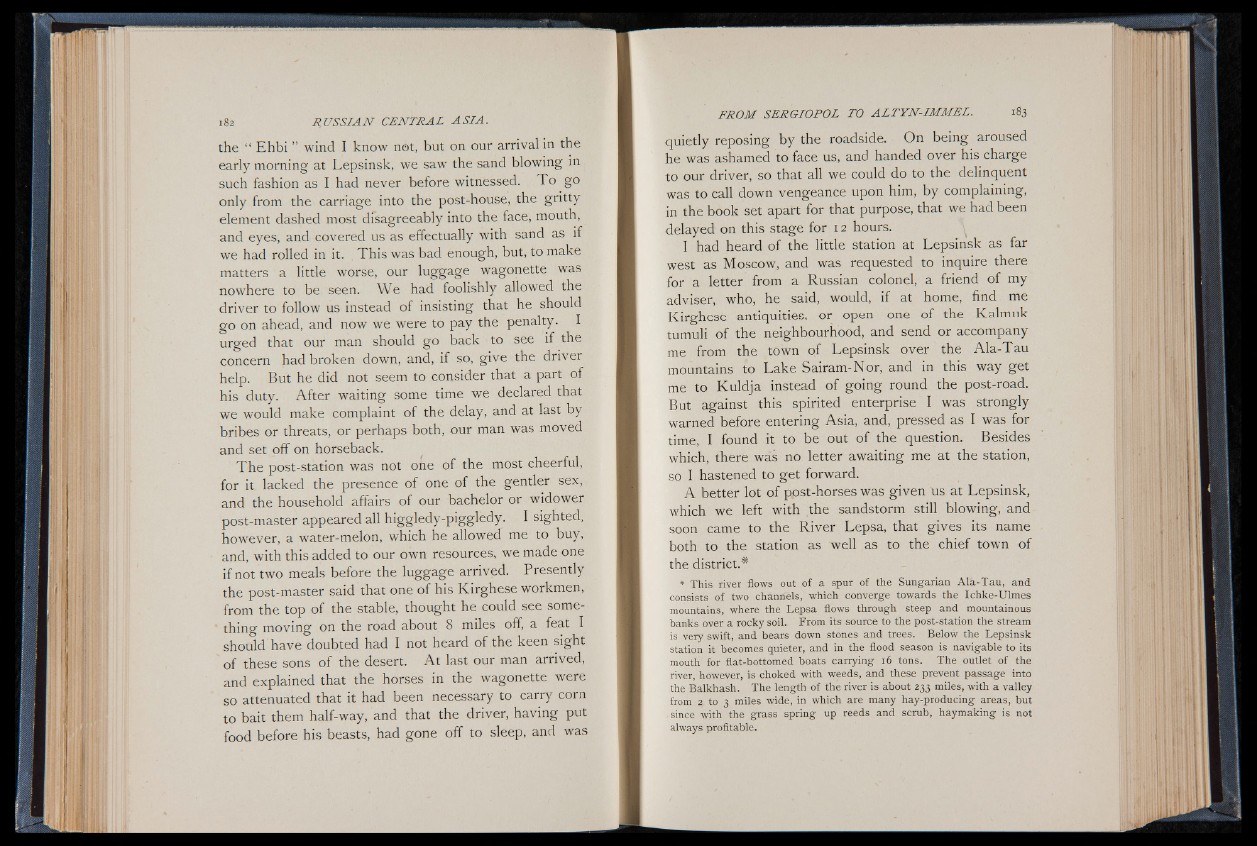
the “ Ehbi ” wind I know not, but on our arrival in the
early morning at Lepsinsk, we saw the sand blowing in
such fashion as I had never before witnessed. T o go
only from the carriage into the post-house, the gritty
element dashed most disagreeably into the face, mouth,
and eyes, and covered us as effectually with sand as if
we had rolled in it. This was bad enough, but, to make
matters a little worse, our luggage wagonette was
nowhere to be seen. We had foolishly allowed the
driver to follow us instead of insisting that he should
go on ahead, and now we were to pay the penalty. I
urged that our man should go back to see if the
concern had broken down, and, if so, give the driver
help. But he did not seem to consider that a part of
his duty. After waiting some time we declared that
we would make complaint of the delay, and at last by
bribes or threats, or perhaps both, our man was moved
and set off on horseback.
The post-station was not one of the most cheerful,
for it lacked the presence of one of the gentler sex,
and the household affairs of our bachelor or widower
post-master appeared all higgledy-piggledy. I sighted,
however, a water-melon, which he allowed me to buy,
and, with this added to our own resources, we made one
if not two meals before the luggage arrived. Presently
the post-master said that one of his Kirghese workmen,
from the top of the stable, thought he could see something
moving on the road about 8 miles off, a feat I
should have doubted had I not heard of the keen sight
of these sons of the desert. A t last our man arrived,
and explained that the horses in the wagonette were
so attenuated that it had been necessary to carry corn
to bait them half-way, and that the driver, having put
food before his beasts, had gone off to sleep, and was
quietly reposing by the roadside. On being aroused
he was ashamed to face us, and handed over his charge
to our driver, so that all we could do to the delinquent
was to call down vengeance upon him, by complaining,
in the book set apart for that purpose, that we had been
delayed on this stage for 12 hours.
I had heard of the little station at Lepsinsk as far
west as Moscow, and was requested to inquire there
for a letter from a Russian colonel, a friend of my
adviser, who, he said, would, if at home, find me
Kirghese antiquities, or open one of the Kalmuk
tumuli of the neighbourhood, and send or accompany
me from the town of Lepsinsk over the Ala-Tau
mountains to Lake Sairam-Nor, and in this way get
me to Kuldja instead of going round the post-road.
But against this spirited enterprise I was strongly
warned before entering Asia, and, pressed as I was for
time, I found it to be out of the question. Besides
which, there was no letter awaiting me at the station,
so I hastened to get forward.
A better lot of post-horses was given us at Lepsinsk,
which we left with the sandstorm still blowing, and
soon came to the River Lepsa, that gives its name
both to the station as well as to the chief town of
the district.*
* This river flows out of a spur of the Sungarian A la -T au , and
consists of two channels, which converge towards the Ichke-Ulmes
mountains, where the Lepsa flows through steep and mountainous
banks over a rocky soil. From its source to the post-station the stream
is very swift, and bears down stones and trees. Below the Lepsinsk
station it becomes quieter, and in the flood season is navigable to its
mouth for flat-bottomed boats carrying 16 tons. The outlet of the
river, however, is choked with weeds, and these prevent passage into
the Balkhash. The length of the river is about 233 miles, with a valley
from 2 to 3 miles wide, in which are many hay-producing areas, but
• since with the grass spring up reeds and scrub, haymaking is not
always profitable.